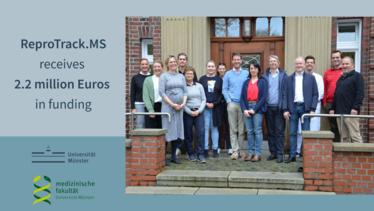ReproTrack.MS receives 2.2 million euros in funding
Starting next year, ten talented post-doctoral researchers will be working in the new BMBF-funded ReproTrack.MS junior scientist research centre. In addition to questions about embryonic developmental potential and molecular markers for predicting the success of assisted reproductive techniques (MAR), their focus will be on investigating the causes of male infertility and improving diagnostics and treatment. Five emerging scientists each work in basic and clinical research, providing a unique opportunity to network, learn from each other and work together to realise translational reproductive research in Münster.
The IRG will conduct one of ten research projects over the next three years. Clinician Scientist Johanna Steingröver, together with IRG director Frank Tüttelmann, will elucidate the genetic causes of azoospermia and investigate the molecular function of the identified genes and encoded proteins. In the IRG project, as in all ReproTrack.MS research projects, emerging scientists and their PIs from the CeRA, the Paediatrics, the Gynaecology, the Radiology and the Institute for Geoinformatics seek to overcome the boundaries between the disciplines through closely interlinked cooperation.
The ten working groups are coordinated by IRG director Frank Tüttelmann together with Sabine Kliesch, Nina Neuhaus and Timo Strünker (CeRA). With a total of €2.2 million in funding, ReproTrack.MS will substantiate the local research landscape in the field of reproductive health. ReproTrack.MS may be extended for a further three years following a successful interim evaluation. Münster is one of a group of five centres that have received funding to set up junior scientist research centres. The other locations - Hamburg, Jena, Leipzig and Ulm - are also involved in reproductive health research with different foci.



